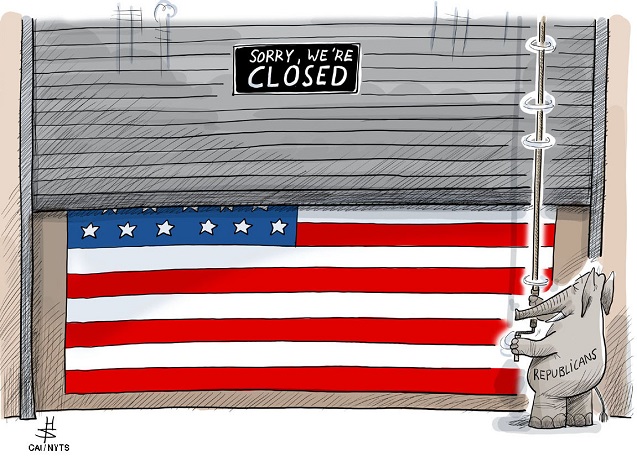
The economist Mark Thoma recently wrote an excellent column for the Fiscal Times linking the fight over the debt ceiling to the larger issue of extreme inequality. I’d like to suggest that the reality is even worse than Mr. Thoma suggests.
Here’s how he put it: “Rising inequality and differential exposure to economic risk has caused one group to see themselves as the ‘makers’ in society who provide for the rest and pay most of the bills, and the other group as ‘takers’ who get all the benefits. The upper strata wonders, ‘Why should we pay for social insurance when we get little or none of the benefits?’ and this leads to an attack on these programs.”
So he links the debt ceiling fight to the influence of the wealthy, who want to dismantle the welfare state because it’s nothing to them, and because they want lower taxes.
One could add that the very inequality that distances the rich from ordinary concerns gives them increased power, and so makes their anti-welfare-state views far more influential.
How, then, are things even worse than Mr. Thoma says? Because many of the rich are selective in their opposition to government helping the unlucky. They’re against stuff like food stamps and unemployment benefits; but bailing out Wall Street? Yay!
Seriously. Charlie Munger, the vice chairman of Berkshire Hathaway, said in 2010 that we should “thank God” for the bank bailouts, but that ordinary people who had fallen on hard times should “suck it in and cope.” And the CEO of AIG — the CEO of a bailed-out firm! — recently told The Wall Street Journal that complaints about bonuses to executives at such firms are just as bad as lynchings (I am not making this up).
The point is that the superrich have not gone John Galt on us — not really, even if they imagine they have. It’s much closer to pure class warfare, a defense of the right of the privileged to keep and extend their privileges.
It’s not Ayn Rand: this is Ancien Régime.
The Government Shutdown: Economics and Politics of Chaos
How did we get here? Interestingly, Ezra Klein at The Washington Post implicitly offers two quite different interpretations.
First, he describes very well what the policy issue, such as it is, amounts to: “This is all about stopping a law that increases taxes on rich people,” Mr. Klein wrote recently, “and reduces subsidies to private insurers in Medicare in order to help low-income Americans buy health insurance. That’s it. That’s why the Republican Party might shut down the government and default on the debt.”
Indeed. There’s a definite class-war aspect to this fight, pitting the interests of the 0.1 percent against those of lower-income families. But at this point the 0.1 percent, by and large, are pleading with the Republicans to knock it off. So while class warfare may have been where this started, the monster has long since escaped from its cage; even Karl Rove, more or less the designated defender of upper-class privileges, is whining that the party won’t listen to him.
In a different article, Mr. Klein alludes to this by quoting Thomas Mann and Norman Ornstein, authors of “It’s Even Worse Than It Looks”: “The G.O.P. has become an insurgent outlier in American politics — it is ideologically extreme; scornful of compromise; and dismissive of the legitimacy of its political opposition.”
It’s very important, I think, to realize that while the G.O.P. appears to have been taken hostage by its radical wing, the general strategy of responding to a lost election by trying to gain through blackmail what the party couldn’t gain at the polls was a consensus decision, arrived at way back in January.
If the leadership is now dismayed by where it finds itself — leading a party of “lemmings with suicide vests,” according to Devin Nunes, a Republican congressman from California — it has only itself to blame.
And a crucial piece of the story, I think, is the conservative bubble, which among other things means that many on the right have wildly distorted ideas about the Affordable Care Act. A fair number of G.O.P. politicians may actually believe that it is a communist plot, or the moral equivalent of slavery, or something.
Coming back to the class warfare issue: My working theory is that wealthy individuals bought themselves a radical right party, believing — correctly — that it would cut their taxes and remove regulations, but failed to realize that eventually the craziness would take on a life of its own, and that the monster they created would turn on its creators as well as the little people.
And nobody knows how it ends.
Thank you for reading Truthout. Before you go…
…We ask that you take just a second to read this message.
We are up against a far-reaching, wide-scale attack on press freedom coming from the Trump administration. Since his inauguration last year, we’ve seen frightening censorship, a right-wing takeover of the news industry, and worsening financial conditions for progressive nonprofits across the board.
We can only resist Trump’s agenda by cultivating a strong base of support. The right-wing mediasphere is funded comfortably by billionaire owners and venture capitalist philanthropists. At Truthout, we have you.
We need your help to sustain the fight against authoritarianism in 2026. Please take a meaningful action in this fight: make a one-time or monthly donation to Truthout. If you have the means, please dig deep.